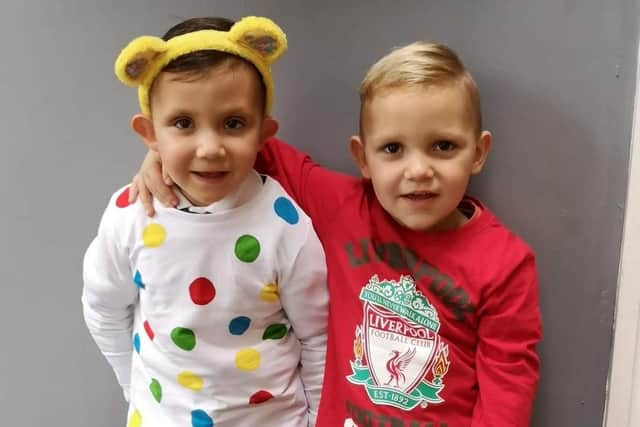'Astonishing' five-year-old boy died from septicaemia hours after being discharged from hospital in Wigan
and live on Freeview channel 276
Theodore Cheetham-Serjent was taken to hospital in December 2019 by his mum Paula after becoming unwell, with symptoms including a high temperature and cold hands and feet.
He was diagnosed with viral gastroenteritis and discharged that same evening.
Advertisement
Hide AdAdvertisement
Hide AdBut an inquest this week at Bolton Coroner’s Court heard his condition deteriorated during the night and he was rushed back in by paramedics several hours later.


Little Theo was found to have meningococcal septicaemia and despite receiving treatment in hospital, he died that morning.
An inquest was called to look at the circumstances surrounding the youngster’s death and address concerns raised by his parents Paula and Paul, who live in Hindley.
Mrs Cheetham-Serjent described her son as being a “much-anticipated” addition to the family when he was born in 2014 and “quite an astonishing little boy”.


Advertisement
Hide AdAdvertisement
Hide AdHe expressed himself in a “matter of fact” way and so, having been a generally healthy child, she knew something was not right when he complained of feeling unwell on December 29, 2019.
She said his feet were “freezing” and his head was “boiling”, so she phoned NHS 111 and was told to take Theo to hospital.
He was behaving erratically, had a temperature of 38.4 degrees Celsius, complained of a sore throat and stomach ache, and had unusual striped marks on his legs.
Mrs Cheetham-Serject said: “When he kept saying he wasn’t so good, the instinct in me knew there was something not right. That’s why I went to the hospital, because I wanted to make him right, I wanted him to be better.”
Advertisement
Hide AdAdvertisement
Hide AdShe carried Theo into the A&E unit and he was triaged by nurse Natalie Rice at 8.54pm, who described him as a “bright, chatty, polite little boy”.
He and his mother explained his symptoms and Mrs Cheetham-Serjent said she had already given him Calpol and ibuprofen. While at the hospital, Theo started to suffer from diarrhoea, the inquest heard.
Ms Rice carried out observations and marked Theo as priority three due to his high temperature, which meant he would be seen in an hour.
Dr Grace Olowonyo, a GP trainee, saw Theo around an hour later and as observations due to be carried out every 30 minutes had not been done, she did them herself.
Advertisement
Hide AdAdvertisement
Hide AdShe told the inquest Theo’s temperature was going down and she diagnosed viral gastroenteritis, before discharging him.
Coroner Timothy Brennand questioned whether she sought advice from a senior colleague, but she said she did not feel she needed it.
Mrs Cheetham-Serjant said Theo asked to go to McDonald’s on the way home for being a “brave boy”, but he could not keep down the chicken nuggets.
Theo was put to sleep in his parents’ bed, so they could check on him, and his mother described him as being “red hot to the touch”.
Advertisement
Hide AdAdvertisement
Hide AdAs she changed his clothes in the night, she found a red rash on the top of his hip and immediately called 999 at 4.45am.
Mrs Cheetham-Serjent said: “As soon as I saw the rash, I knew straight away we were in trouble here. This wasn’t good.”
Paramedics suspected Theo had meningitis, so they gave him antibiotics and took him to Wigan Infirmary.
Paediatric nurse Rebecca Lane told the inquest the hospital was alerted to his imminent arrival as a “red standby”, meaning he was unwell.
Advertisement
Hide AdAdvertisement
Hide AdShe said: “As soon as he arrived with an ambulance crew I knew he was seriously unwell, just looking at him, before any observations were done.”
Dr Swetha Garikparti, now a consultant paediatrician and then a final-year paediatric trainee, said Theo was initially “chatty and lively” but his condition deteriorated.
He was diagnosed with meningococcal septicaemia and she believed he would “go downhill” if they did not do something.
Theo was given more antibiotics and fluids, preparations were made for him to be transferred to Royal Manchester Children’s Hospital and he was intubated.
Advertisement
Hide AdAdvertisement
Hide AdBut at 8.20am he went into cardiac arrest and while his sinus rhythm initially returned, he had another cardiac arrest at 8.51am and could not be revived. He was pronounced dead just after 9am, the inquest heard.
Consultant paediatric and perinatal pathologist Dr Melanie Newbould, who carried out a post-mortem examination, found Theo died from septicaemia neisseria meningitis type B, also known as meningococcal septicaemia. It was described as a “naturally occurring and invasive” condition.
Although Theo had been vaccinated for meningitis B, she said the jab was “never 100 per cent effective”.
Dr Wayne Heaven, consultant in emergency medicine, carried out a post-incident rapid review which started on the same day as Theo’s death.
Advertisement
Hide AdAdvertisement
Hide AdHe believed it was reasonable for Dr Olowonyo to have initially diagnosed Theo with viral gastroenteritis.
But he said: “We know in hindsight those symptoms were indicative of his early meningococcal disease, which progressed through the night to meningococcal septicaemia. But on review of his attendance on the night, I don’t think there is anything there to say there was a presentation of meningococcal septicaemia.”
Dr Heaven explained that meningitis B has the “worst prognosis” and taking Theo back to the hospital a few hours earlier would probably not have changed the outcome.
While concerns were raised about access to blood products for Theo, he said there was only actually a delay of five minutes, they were not a cure and did not contribute to what happened.
Advertisement
Hide AdAdvertisement
Hide AdHe described the red marks on Theo’s legs as “a bit of a puzzle”, with the inquest earlier hearing they had been attributed to a cycling accident and the pathologist not seeing them post-mortem.
Dr Heaven said hospital staff were aware of sepsis, but it was “much more difficult to recognise in children than it is in adults”.
Mr Brennand recorded Theo died from natural causes.
He said the diagnosis of viral gastroenteritis “was not unreasonable in the circumstances” and that Dr Olowonyo did “her honest and noble best within the auspices and construct of her training” to treat him. She was so shocked to hear about his death the following day that she could not face going to work.
After Theo was returned to A&E by paramedics, Mr Brennand said there was “very little that could’ve been done to have saved him” and while the care given was not perfect, there were was no evidence of neglect.
Advertisement
Hide AdAdvertisement
Hide AdSpeaking to Theo’s family, he said: “Nothing that we have said today can bring Theo back. For your loss, I’m truly sorry.”
Thanks for reading. If you value what we do and are able to support us, a digital subscription is just £1 for your first month. Try us today by clicking here
